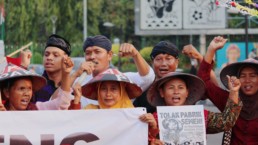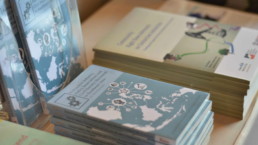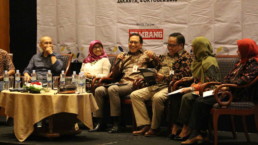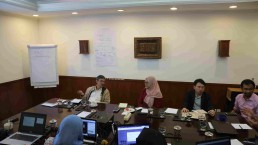Publish What You Pay (PWYP) Indonesia is a civil society coalition for transparency and accountability of extractive resource revenues and governance of oil, gas, minerals and other natural resources. PWYP Indonesia was established in 2007, and registered as Indonesian legal entity in 2012 as Yayasan Transparasi Sumber Daya Ekstraktif with registered foundation number AHU-002650.10.2014. PWYP Indonesia focuses on advancing transparency and accountability of extractive resource governance in Indonesia, as well as in the global level, advocating public interest from civil society point of view, and strengthening civil society’s capacity to play significant role and active engagement in extractive resource governance reform for justice and sustainable development.
PWYP Indonesia affiliated with Publish What You Pay global campaign which was established in 2002 for its purpose on calling extractive company to publish their payment to the government. The coalition encourage on pushing a global transparency initiative in extractive industries called Extractive Industries Transparency Initiative (EITI) in various countries where natural resources are abundant. After a decade, the coalition extend the scope and coverage of its advocacy along the value chain of extractive resources. Publish What You Pay current global offices in London, United Kingdom.
Three Pillars
The Global Conference on the 10th anniversary in Amsterdam born three main pillars that permeate the work of Publish What You Pay in promote transparency and accountability of extractive resources along the value chain.
Promoting the transparency and accountability at the stage before the extraction process and the payment occurs. So the decision to extract (whether extract or not, with whom, on how the prerequisite conditions) should be implemented in a manner that is transparent, accountable and respect the rights of the community, which share the benefit as large as for community. PWYP also monitor the extractive industries activities to ensure commitments and operational standards of the company as well as social accountability and environment of extractive industrial activities.
Promoting the tranparency on revenue value chain of extractive sector; encourages companies to publish their payments both type and amount, as well as the government publish their revenue generated from extractive industries. Revenue information is not only aggregat but also include flow and calculations variables such as production figures, prices and operating cost.
Promoting transparency of revenues generated from the extractive sector, from company payments until it s useful for the state. Managing, allocating, spending and reporting should be transparent and be able to be tracked so that the public can charge to account of revenue expenditure for the prosperity of the people as well. Natural resources revenues are also contained intergenerational rights and responsibilities for sustainable development.
Vision
Implementation of good governance in extractive resources in Indonesia that is transparent, accountable, and in favor of the national interest as a capital for welfare and social justice.
Missions
- Increasing community involvement in the protection, utilization, and supervision of extractive resources and other natural resources;
- Encouraging policy reforms for the management of extractive resources and other natural resources;
- Increase the capacity of civil society groups at the local and national levels in encouraging the management of extractive resources and other natural resources;
- Developing national, local, and global advocacy and campaigns in encouraging the governance of extractive resources and other natural resources;
- Achieving a strong, credible, independent, and sustainable civil society coalition governance.
Scope of Activities
- Research;
- Advocacy;
- Education, training, capacity-building and strengthening;
- Knowledge management;
- Campaigns and public awareness;
- Dialogue with various stakeholders;
- Development of business units to support the independence and sustainability of the coalition organization;
- Network development and international cooperation.



